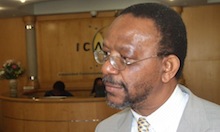
[By Paris Mashile] As it is customary, I hereby present a summary overview of the sector. As a regulator, there is need to pause and take stock, determining to what extent the socioeconomic policy objectives have been advanced. In this regard one has to take into cognisance the regulatory toolkit, which includes the licensing process, ensuring competition, enforcing universal service obligations and facilitating the equitable and meritocratic allocation of scarce frequency resources.
The Altech court decision with regard to the conversion of value-added network service licences to individual licences was a watershed moment, for in one fell swoop managed liberalisation was laid next to the bronze axe as an artefact in the museum of antiquity. All the licences conceived of in terms of the Electronic Communications Act (ECA) have been accordingly converted on time.
The Confederation Cup soccer event, which took place recently, was by all accounts a roaring success. This, as a precursor of the Fifa World Cup, augers well for our preparedness, as a country, in terms of logistical arrangements, such as all manner of ICT networks and services, will ensure that this will be the greatest show this side of eternity. Mobile TV will, without a doubt, have already been licensed and available by then.
As a country, through the leadership of the department of communications, we have committed ourselves to switching off the analogue signal by 1 of November 2011. This is a daunting challenge which will require huge investments of capital — financial and human — and time resources. The shorter the dual-illumination period, the less the operational electricity costs of running two transmitter systems simultaneously.
We also have to ensure that the 5m or so indigent TV households will have the subsidised digital to analogue convertor set-top boxes (STBs) installed as mantelpieces adorning the tops of their analogue Tv sets in their living rooms.
The landing of the Seacom optic-fibre cable on our shores is what the doctor ordered. Together with the about to be licensed Infraco, and the Eassy cable which will follow soon thereafter, customers and consumers will indeed be spoilt for choice. With competition of this nature, broadband service will be ubiquitous and the ICT sector which is the engine of economic growth and social development will drive economic growth.
With regards to markets and competition, we are faced with daunting challenges. A measure of effective competition is when the consumers have countervailing power of getting the best quality of services at the lowest market prices. The mobile termination rates are shamefully highest in SA compared with other peer countries and this is an indictment on us.
With such a high mobile penetration rate such as ours, the economies of scale and scope should dictate a lower termination rate. Anecdotal evidence show that new entrants pay averagely over 40% of their gross revenue to incumbents. This is an insurmountable barrier to entry which has to be speedily addressed. It is our determination to, by any means necessary, bring the incumbents to an understanding that the country is hurting.
The Electronic Communications Act was, in essence, conceived to facilitate convergence of broadcasting, telecommunications and computing services. It is a paradox that in terms of the act, broadcasting networks are entitled to provide electronic services and not vice versa. The act needs to be revisited on this aspect not only in terms of technological advances but the changed market structure as well.
For effective competition to be manifested, there must be effective regulation. But without an in-depth understanding of the underlying technology, regulatory intervention would create a non-vibrant and hamstrung ICT sector. Technology tells you what can be and is done and regulation must facilitate this process. Technology is the tail that wags the dog (regulation).
The digital revolution, liberalisation and competition are the reason why we have ubiquitous mobile services. The Internet has resulted in the world being shrunk to a global village, the so-called World Wide Web. The regulator should help facilitate the provision of all kinds of services imaginable that can be carried by these platforms.
New broadband wireless technologies such as WiMax and LTE have the potential to cheetah pole-vault us into the millennium age of the information society and knowledge-based economy. Using these technologies, relentless effort has to be pursued to bridge the digital divide by ensuring that health, education, commercial and government services are delivered universally and primarily in those rural remote and underserved areas.
A couple of months ago we were inundated with concerns about an inexplicable and sudden upsurge of poor quality of mobile services including dropped calls, and delayed SMSes.
The operators have been hauled before council and read the riot act. This is also undergirded by the recent release of the end-user subscriber charter, which is now to be enforced.
Regrettably, I do not have the luxury of time and space to address other equally important issues that you might want to hear from me. Suffice to say there will be another encounter for this engagement.
I wish to thank the new minister of communications, Siphiwe Nyanda, and the deputy minister, Dina Pule, for hearing us out for our cause and giving with their wisdom. The support we have so far been getting from the department of communications is greatly appreciated. It is well to note that in the short period of their incumbency, there has been a momentum shift. Things are not what they used to be, it is a new ball game that is being played on the turf and we are learning the rules fast and furious.
- Mashile is chairman of the Independent Communications Authority of SA (Icasa)
- This is a shortened version of Mashile’s chairman’s overview published in Icasa’s 2009 annual report

